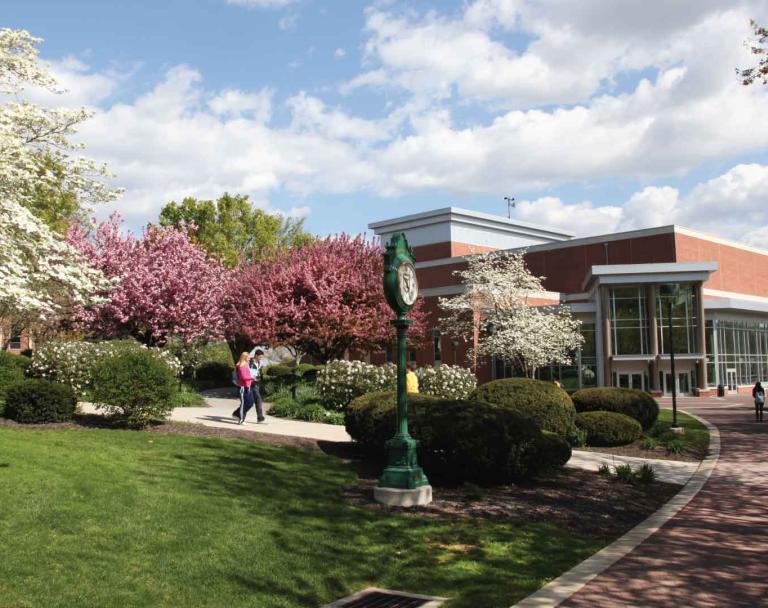Generations of Hope

Generations of Hope aims to break the cycle of poverty through mentorship
Ileen Yeng ’21 grew up 5 miles outside of York City, but didn’t know until recently how much different her life was from kids who lived within its boundaries. It was like an invisible barrier, she says.
As a first generation Asian-American, Yeng could relate to a lot of the challenges students in surrounding school districts faced. But, in her home school district of Central York, she found ample resources that helped her overcome those obstacles.
“When I learned of the drastic disparity for students in the York City School District, it was heartbreaking,” she says. With a lack of resources, it would be nearly impossible for students in the district to break the generational cycles of poverty.
“I couldn’t know that and not do anything,” Yeng says. “We have to step up for them.”
Creating equity
In 2017, Dominic DelliCarpini, Dean for the at York College of Pennsylvania, wanted to do more for the students in the York City School District. He was working with a group of students in the , better known as YCCOSP.
York City students accepted into the program can attend York College on a full scholarship, including room and board. They’re also connected to programs that enrich their experience through leadership training and civic responsibility.
“I wanted to engage the YCCOSP students in a new way,” DelliCarpini says.
His vision was to create a program that would empower YCCOSP students to help create equity for younger York City students, bringing them into the fold of the program and opening the doors of opportunity they may not have been aware existed. DelliCarpini called it Generations of Hope.
The three generations he envisioned included the YCCOSP college students, who would help create the program based on their own advantages or disadvantages from having come up through the school district. The second generation would be the YCCOSP high school students, those who were dual enrolled and taking active steps to embark on their college education. Finally, the third generation would be middle school students, many who had never met a college student before, much less known what York College had to offer.
While DelliCarpini created the program proposal, he also went out into the community seeking support to make it possible. He found that support through the Women’s Giving Circle, a dynamic group of York women invested in making the community a better place. The Women’s Giving Circle awarded two grants to Generations of Hope, totaling more than $20,000 in funds that would not only get the program started, but would help York College start to change the lives for many of these students.
A chance for new opportunities
Through the process of Design Thinking, a strategic system that uses prototyping and testing to develop empathy-based solutions, Generations of Hope became a student-led endeavor, says Cody Miller, Director of Service Initiatives at the Center for Community Engagement.
Indeed, right from the start, YCCOSP students, led by Ileen Yeng, took the lead. They began with the central goals and concept and spent an entire summer, supported by the Women’s Giving Circle grant, interviewing community members and developing a detailed plan for implementation.
Yeng, an and major at York College, became the project manager for Generations of Hope. She helped coordinate what became the format for the program.
It started almost as a weekly after-school program. On Wednesdays, which typically serve as a half-day for students at McKinley Elementary School—just three blocks from York College—students would get on the bus and head to the campus. There, they would participate in projects that exposed them to potential career opportunities and learning experiences. They wrapped up their visits with a shared meal on campus, eating dinner with York College students who had once been where they were.
“These kids are the people we hope shape the York community,” Yeng says. “I always feel like these students are 10 feet behind the start line from everyone else. I hope the opportunities provide equity, so they are able to provide those opportunities for others.”
Creating transformative change
While COVID-19 changed the format of the program, turning it into a virtual meeting, its organizers still see the impact it’s having on younger students. It’s become one of many steps the Center for Community Engagement is making to create transformative change.
“I don’t simply want to fill in the gaps for the terrible parts of our society that have created systematic racism, where a lack of advantage was built into a system that created a permanent underclass,” DelliCarpini says. “This program can’t solve that, but it’s designed to shed a light on that. On the positive side, we hope to have some of these students succeed in ways that we can say, ‘See what happens when we give them the smallest advantage.’ ”

